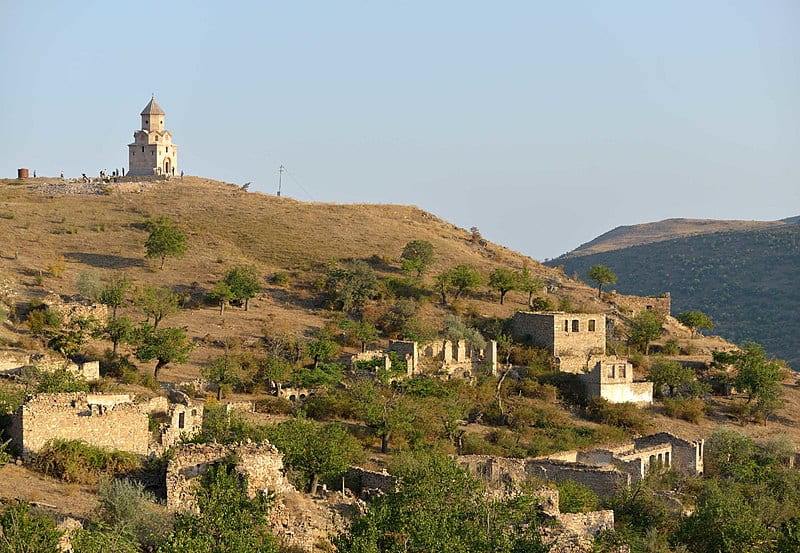On September 27, 2020 Azerbaijan began military advances on the disputed territory of Nagorno-Karabakh. Neither side expected the eventual de facto victory of Baku, which was accepted on November 10 by a Russia-mediated ceasefire agreement. The Armenian side lost not only seven districts of Azerbaijan (the so-called “security zone” which was seized during the First Karabakh War 1992-1994), but also part of the former Nagorno-Karabakh Autonomous region. However, while some in Azerbaijan celebrate victory, the status of Nagorno-Karabakh remains unresolved. The region has been offered cultural autonomy by Baku, but this is not an acceptable resolution for the people in Karabakh, as well as Armenia. While many Armenians accuse Russia of treason, some Azeris accuse Moscow of stealing the victory by not letting Azeri forces seize Stepanakert and finish the reconquest. The complexity of this dispute has left numerous questions unanswered, which we hope to answer within this discussion: Why did this war begin at this time? What role did Russia play? What was the role of Nicol Pashinian? And what is the role of Turkey now? Russian mandate in Karabakh is limited to five years with possible renewal for another five, but what will be next? What is the role of the Minsk group, the EU and the US?
Speakers:
Mikail Mamedov is a Lecturer in the Liberal Studies Program of the School of Continuing Studies at Georgetown University. He is originally from Baku, where he started his academic career studying history. He holds his Diploma (cum laude) from the Department of History of the Moscow Lomonosov State University, (1994). In 1996, his multi-ethnic Azeri-Armenian family immigrated to the USA as refugees. Later, he received his MA from George Washington University in History (2001) and Ph.D. in History from Georgetown University (2010). His dissertation research in Russia and Georgia were sponsored by Fulbright Hays and SSRC dissertation fellowships. He also taught at Southern Utah University in Cedar City, Utah, Georgetown University, and George Mason University. He frequently presents papers at the American Association of Eurasian and Eastern European Studies, the Southern Slavic Studies Association and the Association for Study of Nationalities. His works and articles have been published in Tsentral’naya Aziia i Kavkaz, Russian Review, Russian History, Caucasus Survey, Nationality Papers, Journal of Levant Studies (Israel), Analitykon and online editions Politcom.ru and Russia-Direct.org
Nona Shahnazarian is a social anthropologist who is a Senior Research Fellow at The Institute of Archeology and Ethnography, National Academy of Sciences, Yerevan, Armenia. She is also affiliated with the Center for Independent Social Research, St. Petersburg, Russia. In 2017, she was a Visiting Carnegie Fellow at the University of Stanford. She has published extensively on the issues of gender, war, migration, memory and diaspora in the Caucasus, including two monographs in Russian, In the Tight Embrace of Tradition: War and Patriarchy (2011) and Memory and War: Hamshen-Armenian villages in WWII (based on War Veteran’s Oral Stories) (2013). Her family is originally from Karabakh, but she was born in Mingechaur town from where her family fled back to Karabakh in the wake of the conflict and then moved to Armenia and finally to Krasnodar (Russia).
Ulvi Ismayil is a historian and researcher based in Northern Virginia and originally from Baku. He earned a M.A. in Public Policy from the University of Minnesota in 2005 and a B.A. and M.A. in History from Baku State University in 1998 and 2000, respectively. His published research topics include common stereotypes in Azerbaijan’s rhetoric about the conflict with Armenia, role of writers and literary examples striving for peace, and false heroization attempts. His area of research has been demography and ethnic composition in the South Caucasus during late 19th and early 20th centuries, the demography of Soviet Azerbaijan during its last years, and conflict resolution options for the region.
Anita Khachaturova was born in Krasnodar, though her family is originally from Baku. Anita is a Ph.D. candidate at the Université Libre de Bruxelles (ULB). She has a Master Degree in Political Science (ULB, 2016) and a Llm in International Law (ULB, 2017). Her research deals with emotions and affective dimensions of the Nagorno-Karabakh war. She previously worked as an assistant to the political section of the EU Delegation in Armenia.

